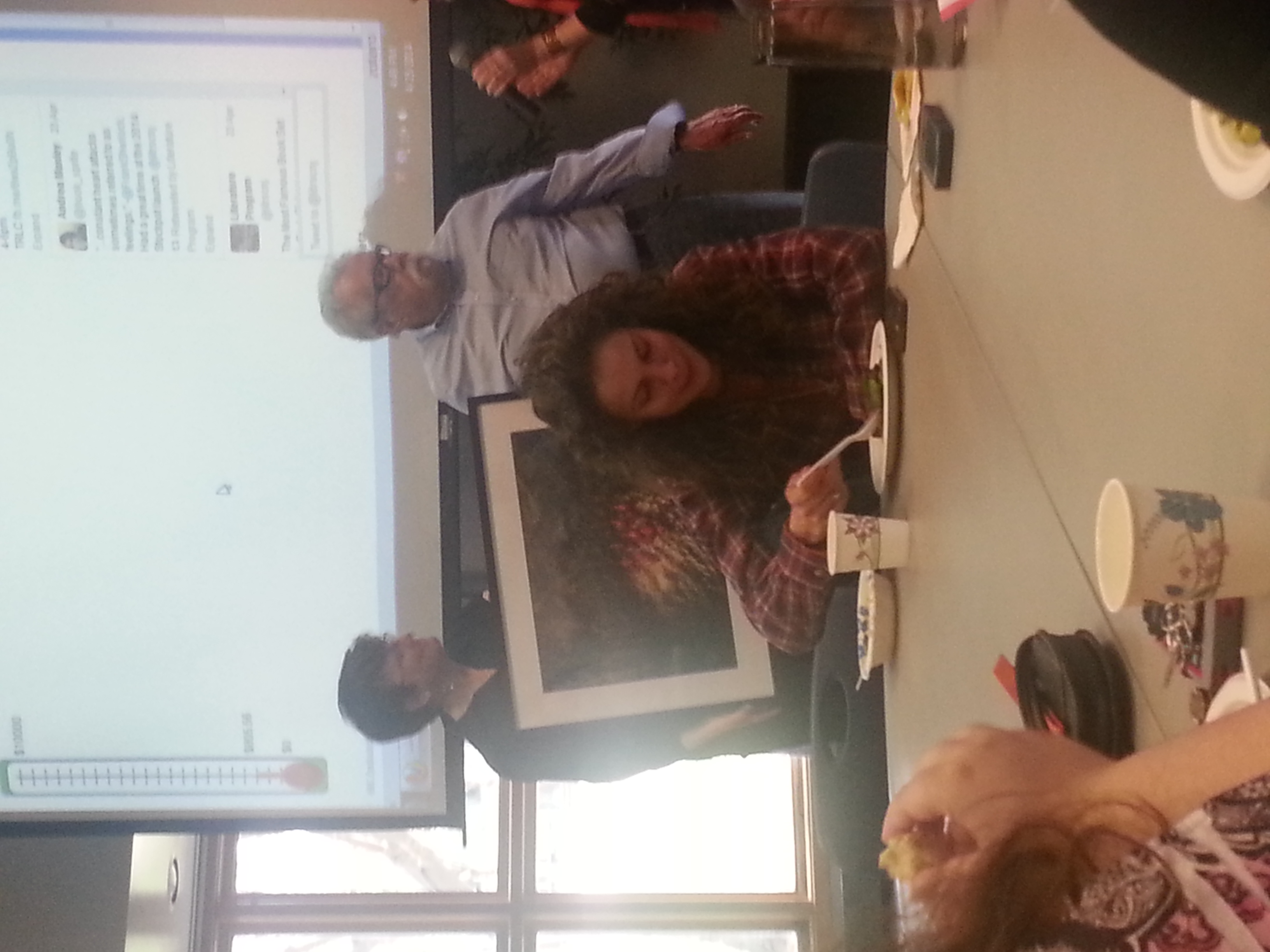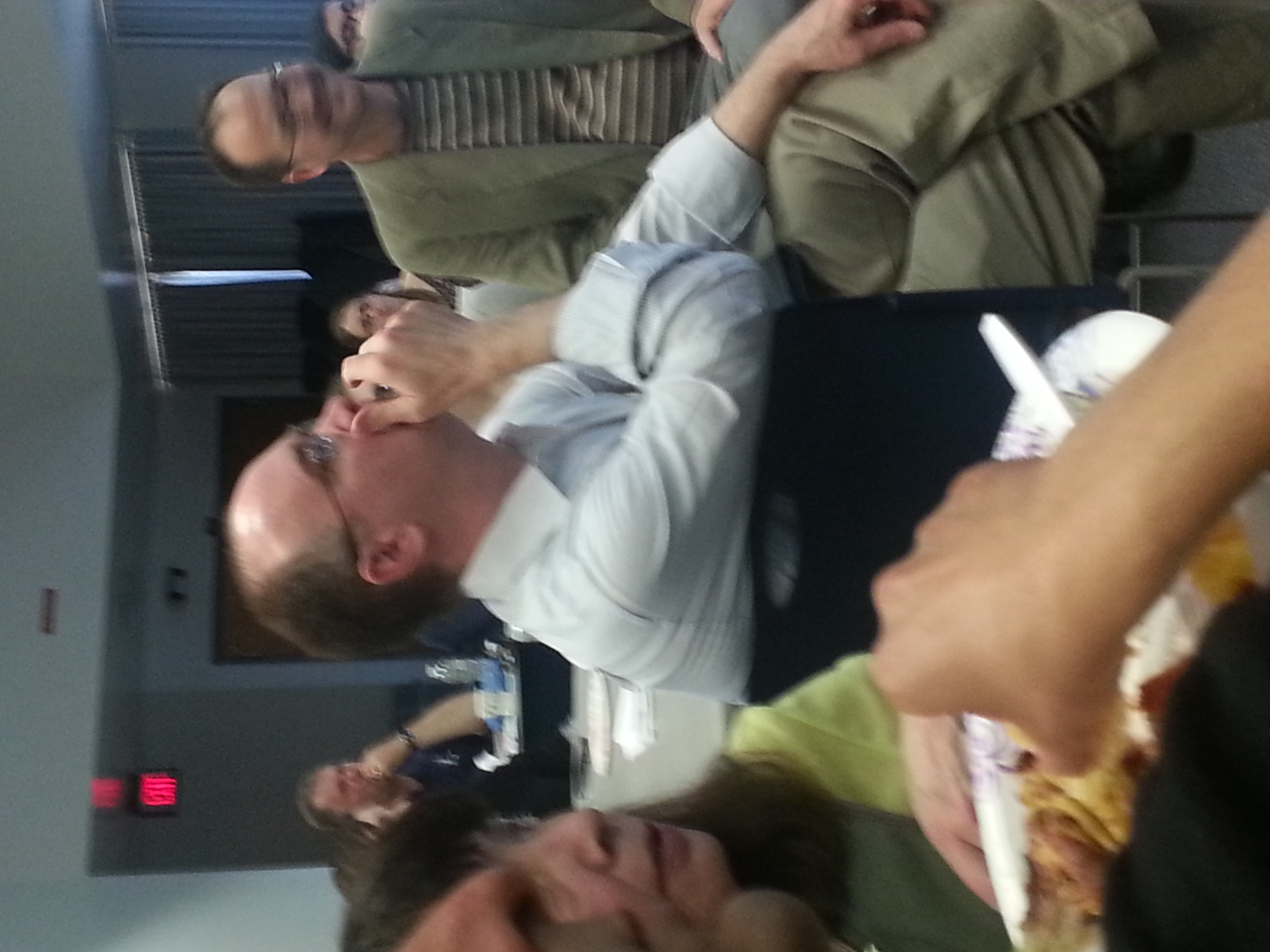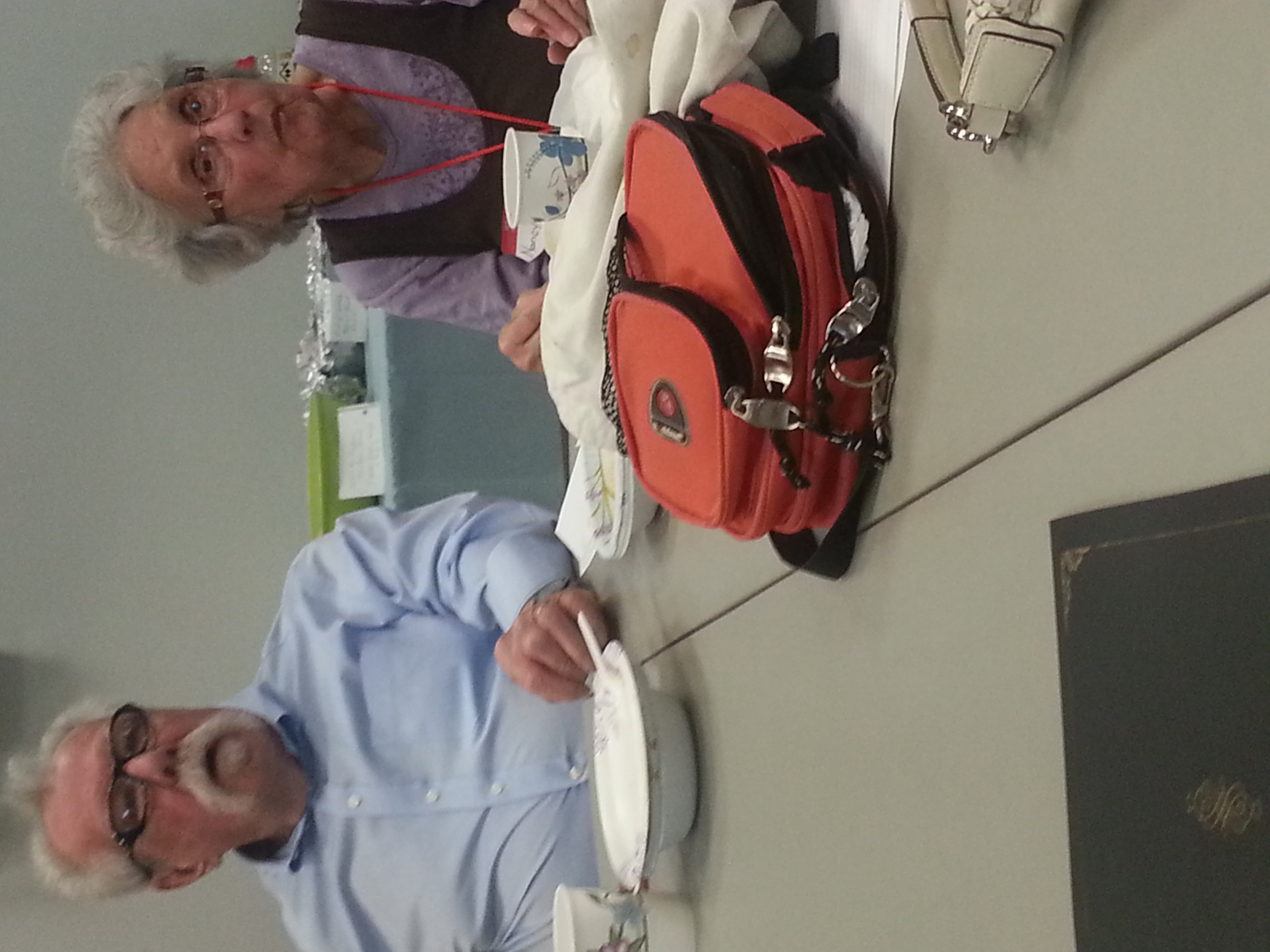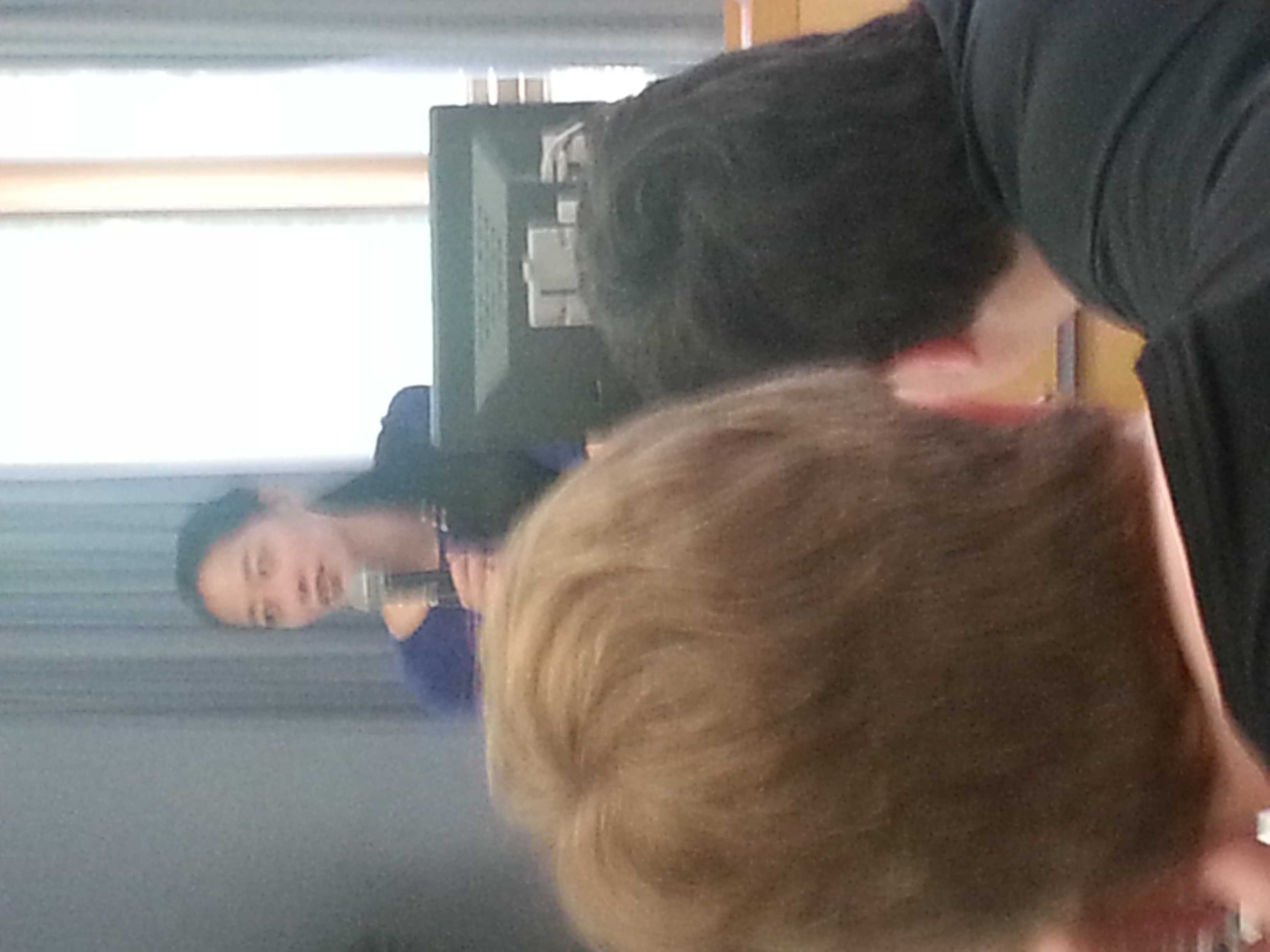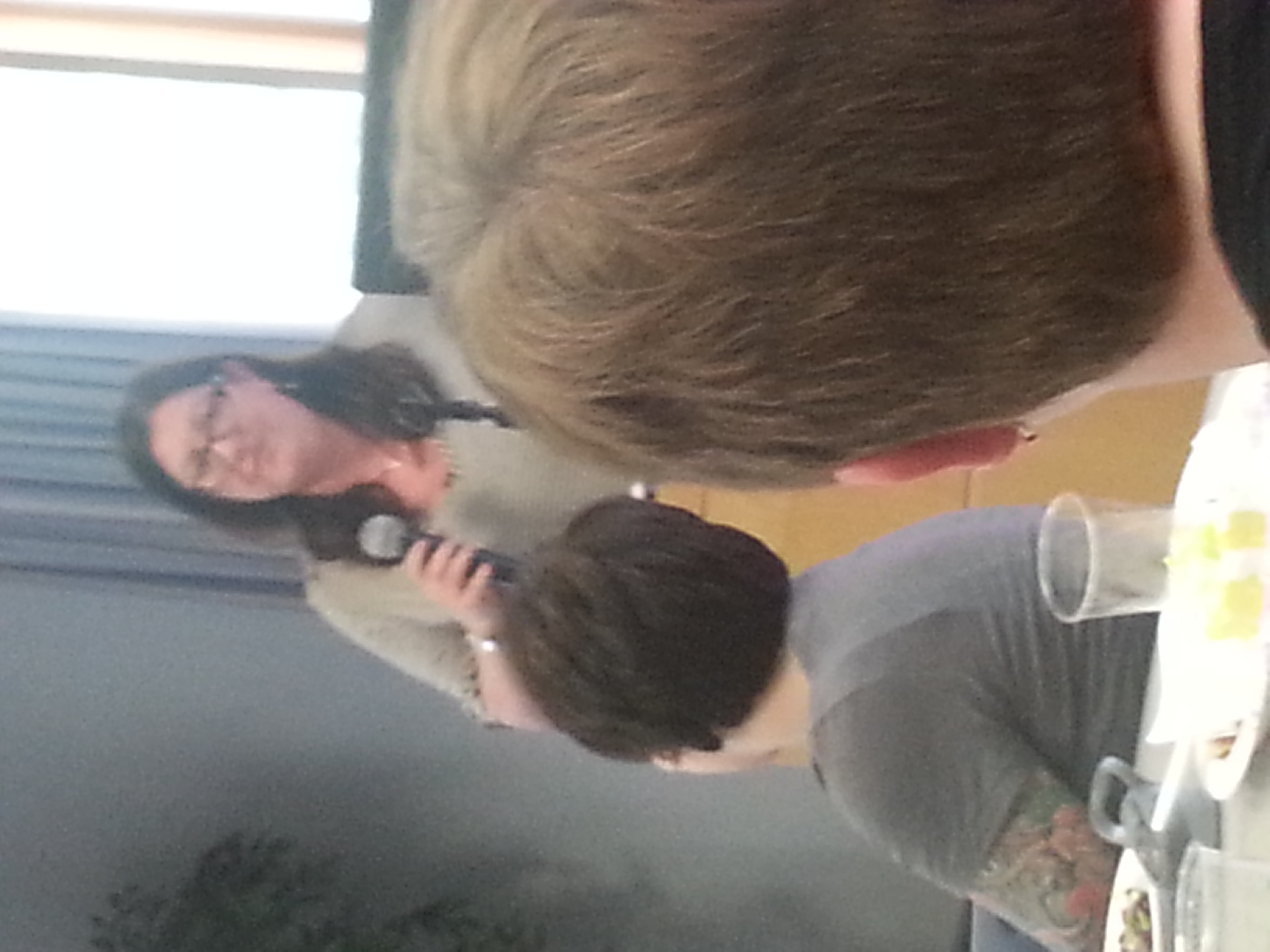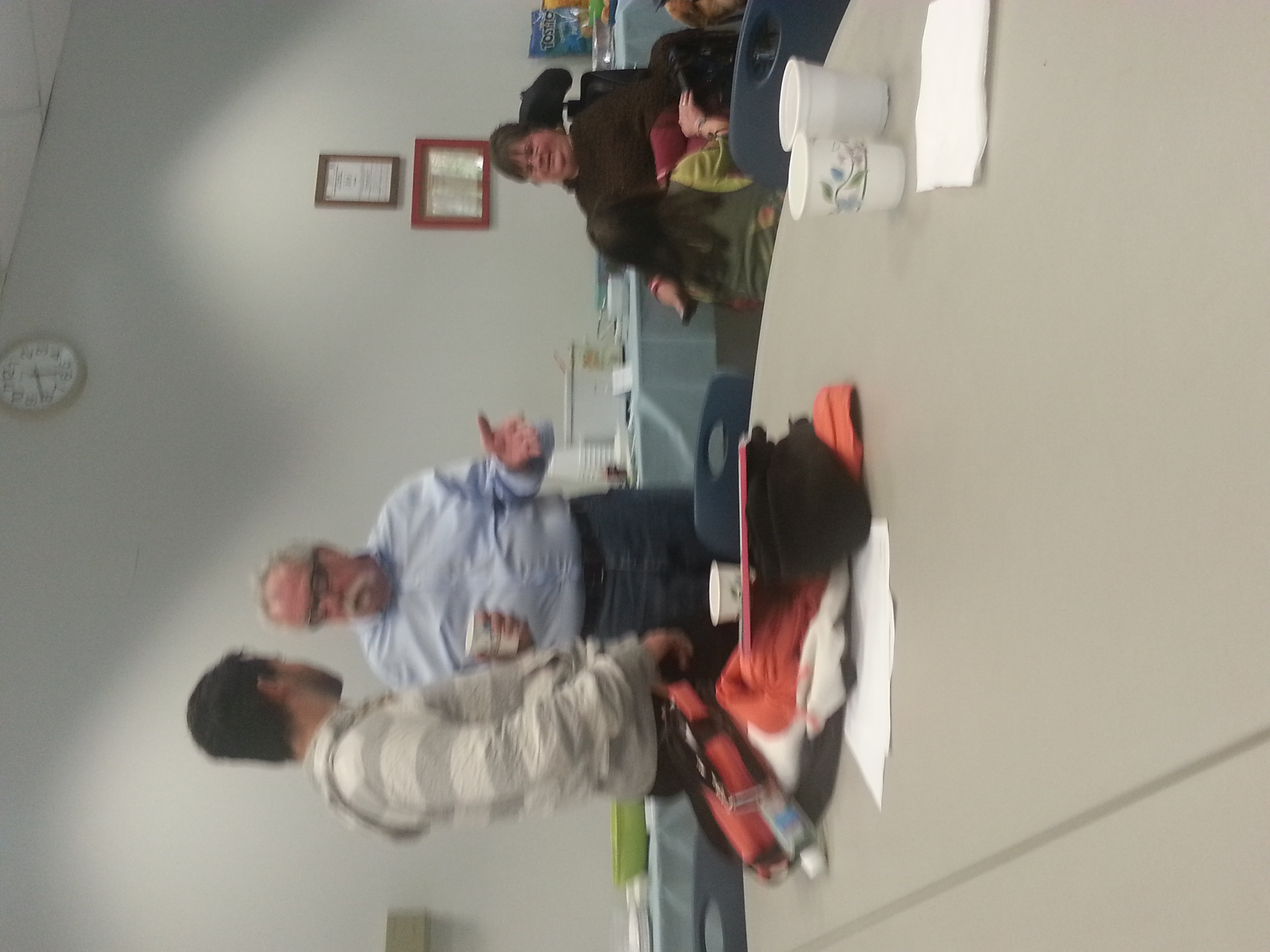I had a great time at this year's Lit Bash down at Stockton. It was nice to come home for an afternoon and, especially, for the first time, get to see some former students of mine down there. I spent time with a handful of those, attended The Bash, where I caught up with a lot of former professors, and then headed to dinner with my parents down the shore before going home late in the evening. This is always one of my favorite days of the year.
ThatCamp Philadelphia: Working With Students Who Have Low Technology Skills
After my initial panel proposal was accepted, I ran this panel on working with students who have low technology skills as the opening panel for ThatCamp Philadelphia. I wanted to run this panel because this is an issue I deal with on a day to day basis and I am always trying to find new ways to initiate learning for my students. Technology skills are extremely important in this job market, so I really stress them in my classes.
Janine Utell took notes for this panel as well.
- Digital citizenship is important. Not just for student work, but also for the job force (applications, etc)
- Many participants noted that their students had a hard time interpreting what they found online. An example given a lot was clicking on “sponsored links” on a Google search.
- Some schools offer a one credit technology course (that can be tested out of by students)
- Library sessions are helpful, but more time needs to be spent on evaluating sources
- This whole “digital natives” thing is nonsense. Many students don’t even know how to use ctrl-f!
- Solutions to this need to come from the curriculum side, not just the classroom
- An issue brought up, and I have heard this from students, is going from high tech classes back to really analog ones
- A list needs to be made, on a school by school basis, of what students need to know for composition level technology skills
- A big requirement that should be built into school handbooks is mandating that they check their email
- There should be “technology across the curriculum” ala writing across the curriculum
- An idea Sherrie Block and I have talked about here at BCC is doing workshops for students on a monthly basis.
- There was a large concern in the room to not just outsource all of this to the library
- I require my students to send me an email from their BCC email to prove they can open it and that it works. I use this for their first quiz grade
- Another great idea that happens in my classes anyway is to have high tech students team up with low tech students
- Walmart has computer only applications now. If you can’t figure it out, you can’t apply
- New Jersey does have a K-12 information literary requirement according to Deb Gussman
- There needs to be outreach to local principals/superintendents
- Have students do a tech survey on their way into college
- Gussman gives her online students a list of what they need to know before taking the class
- I’ve introduced Zotero to my sophomores in the past
- An idea I had was to have to students put programs like Zotero, Firefox, Google Chrome, etc on a flash drive using Portable Apps
- Students absolutely need to learn how to cite before being allowed to use Easybib, Zotero, Moodle, etc
- As Deb Gussman points out, Easybib, Zotero, Evernote and others output errors sometimes
- An idea Utell had was to do coffee sessions with faculty who could be allies
There are so many great ideas here. I am forwarding this post to my
Dean and program director because there is so much we could implement
into our program.
ThatCamp Philadelphia: Small Scale Publications & Digital Editions
The Stockton family ran a number of sessions at ThatCamp Philadelphia, including Deb Gussman’s session on small scale publications and digital editions.
- Gussman is doing a digital edition of the works of Catharine Maria Sedgwick.
- Deb’s steps of a digital project: Strategy and Approach, Scope, Content, Design, Development, Testing, Support.
- Collaboration is very important. Need to find others who have skills you don’t have.
- There are no guarantees that apps, websites, etc will work in a year.
- I suggested the use of emulators ala what is done in modern times with classic interactive fiction.
- Deciding on what app/website/cms to use can often come from other colleagues/friends.
- I brought up the work of Cory Doctorow and how, by releasing his work under a Creative Commons license, readers can create versions of his works for different platforms.
- It is helpful to be familiar with remix culture in general.
- A great idea from John Theibault: in grant applications, include money for development of emulators for later editions when platforms become obsolete.
- Creative Commons licensing allows others to care more about the preservation of your work than you do.
- A lot of Gussman’s work with Sedgwick is coming from Google Books.
- Theibault’s students digitized Philadelphia’s directories.
- Back in 2003, I worked on the digitization of the American Weekly Mercury in one of Tom Kinsella’s classes.

Deb leading the discussion.

Adeline Koh, John Thebault, and Rebecca Goldman listen to the discussion.
ThatCamp Philadelphia: Digital Scholarship & The Unpress
A newer member of the Stockton family, Adeline Koh, ran a session on digital scholarship that was equally interesting and very engaging. Being off of the tenure track, and not at a university, I had a different perspective than some others brought to it. Others like Amanda French, who aren’t teaching right now, brought a unique perspective as well.
- Ulyssesseen.com is an app for Ulysses. Cool.
- Big question about whether digital publications count towards tenure.
- Kathleen Fitzpatrick’s Planned Obselence and Shakespeare Quarterly’s move to open peer review are brought up.
- Deb Gussman asks for a definition of what “open access” means.
- Cost and institutional support are important.
- Siobhan Phillips asks about differences in cost between open and closed peer review.
- How much worth do you get out of a two year process for a scholarly journal?
- I blurt out “very little!”
- Amanda French asks at what point in the process should peer review come in?
- Creating an epub is so easy now. I need to create an epub/mobi of my MA thesis.
- Amanda also mentioned Press Forward.
- Deb about two big factors in self publication…moving from format to format and lessening interest over time…
- Siobhan Phillips had a great idea about having organizations in various fields creating open access bibliographies.
- Discipline loyalties are more important than institutional loyalties.
- Because I am not on tenure track, I definitely have different relationships to these issues than others in the room. I mentioned that I don’t feel comfortable publishing in something that couldn’t easily be accessed by my grandparents and there was definitely some amused looks. Whatever. I’d rather people have access to my work than worry about being “legitimate” or whatever.
- Gussman wonders if outside tenure review can be applied to peer review? Digital Humanities Quarterly already does I believe.
- Amanda and I discussed the impact of self published or open access published works. We both get comments, emails, and know where readers are coming from.
- Janine Utell: Decide what your career could look like and make best case you can.

Adeline's notes on the white board.

A good shot of some of the room including Siobhan, Deb, Adeline, and my TweetDeck.

Amanda and Adeline listen to Janine Utell speak near the end of the session.
ThatCamp Philadelphia: An Overview
A few weeks ago, I had the great pleasure of attending ThatCamp Philadelphia at Chemical Heritage in Philadelphia. After getting a little lost (4th and Chestnut was closed for a protest), I made it to the conference and found out that the session I proposed a few days before had been picked. I really appreciate that, despite not being there, people still voted for my session. I met up with old friends like Amanda French (lots of ohhhs and ahhh when she mentions she is ThatCamp coordinator), Deb Gussman (10 years ago, she was my first literature professor and now she is attending my panels. Wow.), and John Theibault and settled in at the conference, which had very impressive coffee. I also met longtime Twitter friend Janine Utell and became acquainted at lunch with very awesome people like Siobhan Phillips and Rebecca Goldman and Adeline Koh, a new friend from the Stockton family.
(although I wish I could have been at lunch with John and Amanda because I hear they discussed Edna St. Vincent Millay, one of my favorite poets)

The main meeting room was packed by the time I got to the conference. I got a little lost on the way towards 4th street because of traffic being blocked by a protest march. Google Maps on my phone, run through my speakers, really saved me.

I spent a lot of time during the day with Amanda French, who is That Camp Coordinator (oohhh, aahhh).

One of the most interesting aspects of this unconference was how good the coffee is at Chemical Heritage.

The day was planned via a series of poster boards.
ThatCamp Jersey Shore: Engaging With Massive Humanities Datasets
The final panel of ThatCamp: Jersey Shore was run by Amanda French on engagement with massive humanities datasets. I’ve been tipping my toes into this field a bit recently, so I was eagerly awaiting this panel.
- Franco Moretti’s very important Graphs, Maps, and Trees was discussed. Even with canon expansion, still only 10% of 19th century publications.
- Digital humanities apply millions of pieces of data to Dickens instead of Foucault.
- Moretti article Style Inc. looks at thousands of titles.
- What does these large datasets do to applications like the Oxford English Dictionary? For example, the OED’s proclamation that OMG was first used in 1914.
- Someone (Amanda?) wondered if these large datasets are leading to something like Borges’ Library of Babel.
- Datasets more about questions than theory.
After ThatCamp was over, I headed out for lunch With Amanda, John Theibault, and Deb Gussman. A great end to an excellent conference.
ThatCamp Jersey Shore: Open Source Tools
I believe this panel on open source tools was the last one on the first day. We ended up going around the room and discussing open source tools we have found useful in the classroom.
- Joomla is a promising CMS that has many useful plugins. Someone showed one which integrates photo galleries and Google Maps.
- There was some discussion, since we were there, of Atlantic City. The Atlantic City Experience uses Joomla.
- AC is an easy city to forget because a lot of the living documents are gone.
- Deborah Gussman talked about a digital edition (I can’t remember the author unfortunately…Deb?) she is working on. She wants to supplement it with political and legal documents. And wedding dresses. There was some talk that Omeka may be more useful for this.
- A big issue we discussed was how there is no easy way to do backup on most blogging platforms. I also brought up Zotero as an example of that too. There needs to be a simpler way for non-techy users to do backup/move content.
- Nines.org has paid and open source content. A “guest pass” can be acquired. They also fund digital humanities archives like Herman Melville’s Typpe.
